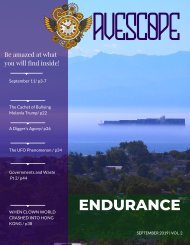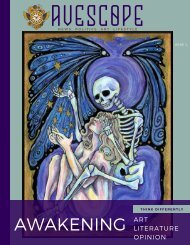Avescope Memento Mori
Avescope Memento Mori. Remember Death. An amazing new magazine about death and remembrance. Art. Photography. History. Fiction. Culture. Poetry. Avescope Memento Mori has it all. This issue is so amazing, it almost makes julienne fries. Thanks to all our contributors: Catherine Clark, Joanna Hatton, Tamsin McKenna-Williams, Catherine Jackson, Blackbird's Photography, Auguste von Osterode, David Simon, Anike Kirsten, Kimm Fernandez, Neva Lee, Tiffany Tong, Matthew Sheetz, Christopher Antim, Karen Lee, LD Towers
Avescope Memento Mori. Remember Death. An amazing new magazine about death and remembrance. Art. Photography. History. Fiction. Culture. Poetry. Avescope Memento Mori has it all. This issue is so amazing, it almost makes julienne fries. Thanks to all our contributors:
Catherine Clark,
Joanna Hatton,
Tamsin McKenna-Williams,
Catherine Jackson,
Blackbird's Photography,
Auguste von Osterode,
David Simon,
Anike Kirsten,
Kimm Fernandez,
Neva Lee,
Tiffany Tong,
Matthew Sheetz,
Christopher Antim,
Karen Lee, LD Towers
You also want an ePaper? Increase the reach of your titles
YUMPU automatically turns print PDFs into web optimized ePapers that Google loves.
<strong>Memento</strong><br />
<strong>Mori</strong><br />
<strong>Memento</strong> <strong>Mori</strong>. “Remember I must die”.<br />
“Or must I?”, ask the transhumanists. The<br />
impact of merging technology with the<br />
human being will be felt no more<br />
powerfully than within the plans of<br />
transhumanists who seek to postpone and<br />
even eradicate death by using technology.<br />
Originally from the realms of the<br />
conspiracy world, the idea that human<br />
consciousness can somehow be harnessed<br />
and uploaded as data now occupies a<br />
serious place in modern research and<br />
development.<br />
There are some who believe human<br />
consciousness can be transferred and<br />
stored as data. And this may not be so<br />
crazy as it sounds. After all, psychologists<br />
are familiar with the computer analogy,<br />
when it comes to human memory. The<br />
alleged BT Soulcatcher project, a theory<br />
promoted by conspiracy theorists in the<br />
early 2000s is actually a real project<br />
discussed in an Open University video<br />
available on Youtube, some years ago.<br />
The video discusses the concept that in<br />
around 2030/2040, the technology should<br />
exist to enable a person to get a simple<br />
injection into their arm, containing some<br />
nanotechnology devices which would<br />
then connect to every neuron in their<br />
brain, enabling an exact replica of their<br />
<strong>Avescope</strong> | 25<br />
Tamsin<br />
McKenna-<br />
Williams<br />
brain to be transferred as data, containing<br />
all the person’s thoughts and memories.<br />
This could be a truly revolutionary<br />
technology for Alzheimer’s and dementia<br />
sufferers. If one’s brain were to be mapped<br />
prior to the onset of such a condition, it<br />
might be possible to effectively re-boot<br />
key personal default settings and enable<br />
those who are losing their memory to<br />
maintain their identity. It could act as the<br />
same type of health-related insurance as<br />
harvesting eggs and sperm when a person<br />
is young, to enable them to put having<br />
children on hold until their finances<br />
permit it.<br />
This technology could also be utilized to<br />
reanimate the dead. The implications of<br />
such being very hard to really quantify,<br />
given we still do not fully understand how<br />
the mind connects to the brain and how<br />
things work from a more spiritual<br />
perspective.<br />
If this technology were to advance to a<br />
level where memories and entire lifetimes<br />
could be transferred, as data. In theory, the<br />
life experiences of everyone could be<br />
preserved and possibly reanimated later in<br />
a different, cloned or synthetic body. The<br />
pros and cons of this are manifold and the<br />
related ethics, legal ramifications and<br />
potential regulation are about as complex<br />
as it gets. It’s tough enough for regulators<br />
and data processors to guarantee the<br />
safety of our name and address, never<br />
mind our entire consciousness and<br />
memories. Goodness knows what levels of<br />
exploitation and potential risk this type of<br />
innovation could expose humanity to. And<br />
there would likely be great inequality in<br />
any system that promised to effectively<br />
offer longer life or potential reincarnation<br />
by design. Those who could afford to<br />
become immortal (of sorts) would be<br />
preserved, regardless of how important<br />
their own life experiences were in the<br />
grand scheme of things, yet those who<br />
may have genuinely interesting data, who<br />
may be too poor to preserve it, would be<br />
lost to the world of human consciousness<br />
data storing.





